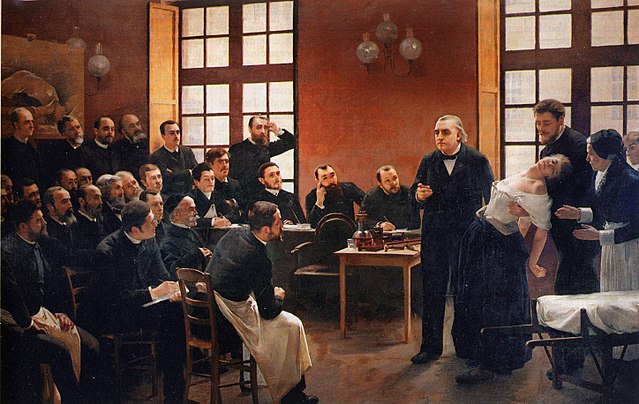Content deleted Content added
|
|
Line 17:
and task-motivated subjects. American Journal of Clinical Hypnosis, 18, 252-262.</ref> while its use as a form of entertainment for an audience is known as "[[stage hypnosis]]", a form of [[mentalism]].
Hypnosis-based therapies for the management of [[irritable bowel syndrome]] and [[menopause]] are supported by evidence.<ref>{{Cite journal|last1=Peters|first1=S. L.|last2=Yao|first2=C. K.|last3=Philpott|first3=H.|last4=Yelland|first4=G. W.|last5=Muir|first5=J. G.|last6=Gibson|first6=P. R.|date=2016|title=Randomised clinical trial: the efficacy of gut-directed hypnotherapy is similar to that of the low FODMAP diet for the treatment of irritable bowel syndrome|journal=Alimentary Pharmacology & Therapeutics|language=en|volume=44|issue=5|pages=447–459|doi=10.1111/apt.13706|pmid=27397586|s2cid=42525698|issn=1365-2036|doi-access=free}}</ref><ref>{{Cite journal|last1=Lacy|first1=Brian E.|last2=Pimentel|first2=Mark|last3=Brenner|first3=Darren M.|last4=Chey|first4=William D.|last5=Keefer|first5=Laurie A.|last6=Long|first6=Millie D.|last7=Moshiree|first7=Baha|date=January 2021|title=ACG Clinical Guideline: Management of Irritable Bowel Syndrome|journal= American Journal of Gastroenterology|language=en-US|volume=116|issue=1|pages=17–44|doi=10.14309/ajg.0000000000001036|pmid=33315591|issn=0002-9270|doi-access=free}}</ref><ref name="auto">{{Cite journal|date=November 2015|title=Nonhormonal management of menopause-associated vasomotor symptoms: 2015 position statement of The North American Menopause Society|url=https://pubmed.ncbi.nlm.nih.gov/26382310/|journal=Menopause|volume=22|issue=11|pages=1155–1172; quiz 1173–1174|doi=10.1097/GME.0000000000000546|issn=1530-0374|pmid=26382310|s2cid=14841660|access-date=7 September 2021|archive-date=22 March 2021|archive-url=https://web.archive.org/web/20210322145613/https://pubmed.ncbi.nlm.nih.gov/26382310/|url-status=live}}</ref> Use of hypnosis for treatment of other problems has produced mixed results, such as with [[smoking cessation]].<ref>{{Cite journal|title=Hypnotherapy is more effective than nicotine replacement therapy for smoking cessation: Results of a randomized controlled trial|year=2014|doi=10.1016/j.ctim.2013.12.012|language=en|url=https://www.sciencedirect.com/science/article/abs/pii/S0965229913002100|last1=Hasan|first1=Faysal M.|last2=Zagarins|first2=Sofija E.|last3=Pischke|first3=Karen M.|last4=Saiyed|first4=Shamila|last5=Bettencourt|first5=Ann Marie|last6=Beal|first6=Laura|last7=Macys|first7=Diane|last8=Aurora|first8=Sanjay|last9=McCleary|first9=Nancy|journal=Complementary Therapies in Medicine|volume=22|issue=1|pages=1–8|pmid=24559809|access-date=2 March 2021|archive-date=22 December 2021|archive-url=https://web.archive.org/web/20211222162421/https://www.sciencedirect.com/science/article/abs/pii/S0965229913002100|url-status=live}}</ref><ref>{{Cite journal|title=Hypnosis for smoking cessation: a randomized trial|year=2008|pmid=18569754|language=en|url=https://pubmed.ncbi.nlm.nih.gov/18569754/|last1=Carmody|first1=T. P.|last2=Duncan|first2=C.|last3=Simon|first3=J. A.|last4=Solkowitz|first4=S.|last5=Huggins|first5=J.|last6=Lee|first6=S.|last7=Delucchi|first7=K.|journal=Nicotine & Tobacco Research|volume=10|issue=5|pages=811–818|doi=10.1080/14622200802023833|s2cid=36395279|access-date=2 March 2021|archive-date=3 March 2022|archive-url=https://web.archive.org/web/20220303055959/https://pubmed.ncbi.nlm.nih.gov/18569754/|url-status=live}}</ref><ref>{{Cite journal|last1=Barnes|first1=Joanne|last2=McRobbie|first2=Hayden|last3=Dong|first3=Christine Y|last4=Walker|first4=Natalie|last5=Hartmann-Boyce|first5=Jamie|date=2019-06-14|editor-last=Cochrane Tobacco Addiction Group|title=Hypnotherapy for smoking cessation|journal=Cochrane Database of Systematic Reviews|volume=2019|issue=6|pages=CD001008|language=en|doi=10.1002/14651858.CD001008.pub3|pmc=6568235|pmid=31198991}}</ref> The use of hypnosis as a form of therapy to retrieve and integrate early trauma is controversial within the scientific mainstream. Research indicates that hypnotising an individual may aid the formation of false memories,<ref>{{cite book |last1=Lynn |first1=Steven Jay |last2=Krackow |first2=Elisa |last3=Loftus |first3=Elizabeth F. |author-link3=Elizabeth Loftus |last4=Locke |first4=Timothy G. |last5=Lilienfeld |first5=Scott O. |author-link5=Scott Lilienfeld |date=2014 |chapter=Constructing the past: problematic memory recovery techniques in psychotherapy |editor1-last=Lilienfeld |editor1-first=Scott O. |editor2-last=Lynn |editor2-first=Steven Jay |editor3-last=Lohr |editor3-first=Jeffrey M. |title=Science and pseudoscience in clinical psychology |edition=2nd |location=New York |publisher=[[Guilford Press]] |pages=245–275 |isbn=9781462517510 |oclc=890851087}}</ref><ref>{{Cite book |last=French |first=Christopher C. |url=https://www.academia.edu/101922617 |title=The Reliability of UFO Witness Testimony |publisher=UPIAR |year=2023 |isbn=9791281441002 |editor-last=Ballester-Olmos |editor-first=V.J. |location=Turin, Italy |pages=283–294 |chapter=Hypnotic Regression and False Memories |editor-last2=Heiden |editor-first2=Richard W.}}</ref> and that hypnosis "does not help people recall events more accurately".<ref>{{cite news |last1=Hall |first1=Celia |title=Hypnosis does not help accurate memory recall, says study |url=https://www.telegraph.co.uk/news/worldnews/1338671/Hypnosis-does-not-help-accurate-memory-recall-says-study.html |archive-url=https://ghostarchive.org/archive/20220111/https://www.telegraph.co.uk/news/worldnews/1338671/Hypnosis-does-not-help-accurate-memory-recall-says-study.html |archive-date=11 January 2022 |url-access=subscription |url-status=live |website=Telegraph |access-date=11 March 2019|date=26 August 2001}}{{cbignore}}</ref> Medical hypnosis is often considered [[pseudoscience]] or [[quackery]].<ref name=naud/>
{{TOC limit|3}}
|
 Article Images
Article Images